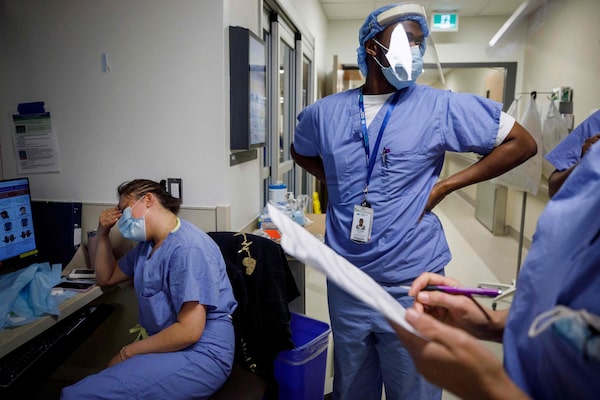
Bill 124 faced increasing criticism during the COVID-19 pandemic as front-line health care workers in overwhelmed hospitals and long-term care homes were subject to a compensation cap of 1 per cent annually for a three-year term.COLE BURSTON/AFP/Getty Images
Ontario is appealing a November court ruling that struck down the province’s contentious wage-cap legislation, arguing the judge was wrong in finding it violated constitutional collective bargaining rights.
Bill 124, passed by Premier Doug Ford’s government in 2019, capped compensation increases for roughly 780,000 workers – including employees of universities and colleges, school boards, Crown corporations and agencies – to 1 per cent annually for a three-year term.
The legislation was billed as a cost-saving measure and faced increasing criticism during the COVID-19 pandemic as front-line health care workers in overwhelmed hospitals and long-term care homes were subject to the cap. Unions argue the bill has driven workers away from the strained health care system and say the government’s decision to appeal is disappointing.
The government served a notice of appeal on Thursday, the final chance it had within a 30-day window, to more than 70 unions who successfully challenged the legislation in the Ontario Superior Court of Justice. Asked about the initial court ruling in November, Mr. Ford called it “interesting” and said he had faith the province could win an appeal as other provincial courts have previously ruled in favour of governments on laws limiting public-sector wages.
In its submission, the government is arguing Justice Markus Koehnen erred in his decision to repeal the legislation on a number of grounds and calling for the appeal to be allowed with costs dismissed. The government contends Bill 124 didn’t infringe on collective bargaining rights considered part of the guarantee to free association in the Charter of Rights and Freedoms, as Justice Koehnen ruled.
The government is also challenging the lower court’s ruling that any infringement of Charter rights isn’t saved under Section 1 that allows for rights to be limited if deemed to serve a justifiable purpose.
Justice Koehnen found the government didn’t provide a rationale for needing the legislation to cut costs while at the same time being able to provide financial relief to the broader public more than 10 times larger than the projected savings from Bill 124. He cited the government’s decision to refund and eliminate licence plate sticker fees as one such initiative, costing the province $1-billion annually.
The province posted a surplus of $2.1-billion in 2021-22, its first since 2007-08, after initially projecting a deficit upward of $30-billion.
“Ontario was not facing a situation in 2019 that justified an infringement of Charter rights,” he wrote in his November decision, noting Bill 124 set the wage cap at a rate below what employees were obtaining in negotiations.
But the government contends the “pressing and substantial objective” advanced by Bill 124 was to “manage the province’s finances in a responsible manner and to protect the sustainability of public services” without cutting services, laying off workers or raising taxes.
Paul Cavalluzzo, a lawyer representing the Ontario English Catholic Teachers’ Association in the challenge, said he believes the court judgment was “well-reasoned” and is confident it can be defended.
Ontario Nurses’ Association interim president Bernie Robinson said the government’s appeal is “despicable” and will put on hold back-pay negotiations that the union was hoping to start early in the new year. Ms. Robinson said with the bill repealed, unions have been preparing to return to the bargaining table and negotiate new wage agreements not subject to the cap.
Unions took issue with the government spending money on a court challenge when they say increasing worker wages would be more beneficial.
“Disappointing really doesn’t describe the level of emotion and frustration that Ontario nurses are feeling right now,” Ms. Robinson said.
If the decision is upheld, the province could be on the hook for significant catch-up payments to compensate for lost wages. The province’s Financial Accountability Office has estimated that Ontario’s bill for pay hikes denied by the legislation since 2019 could come to $8.4-billion, including $2.1-billion in retroactive pay this fiscal year.
In its September report, the FAO said 30 per cent of affected public-sector employees still had yet to negotiate a deal under the bill, including more than 100,000 hospital workers.